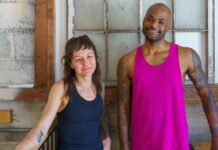 “We’re building the muscle that’s not being built.”
“We’re building the muscle that’s not being built.”
If that sounds like a mantra, you’re not far off. Though she doesn’t call it that, Anjali Sunita repeats the phrase often enough that it sure feels like one.
Dressed in a loose, gray-and-white striped sweater over cotton palazzo pants, the 32-year-old yoga instructor sits barefoot and cross-legged. With huge expressive eyes, delicate cheekbones and fluttering hands, she’s a slim little sparrow perched on a chair.
Anjali is leading our group of four women through a class called “Out-Loud Meditation: Find Your Voice & Speak Your Honest Truth.”
Silly me, I thought yoga was involved.
So I came dressed appropriately. Turns out that’s not necessary. For there is no movement in this class, at least not of the Downward-Facing Dog variety. We all sit in a circle
and talk.
Anjali has been teaching yoga at the Baltimore Yoga Village, which she founded in 2007, after years of training at ashrams in Canada and India. Earnest about her endeavors to “create a sense of greater peace and ease for individuals and communities,” she nonetheless laughs easily and puts her bumbling charges—us—at ease. This workshop is all about, as Anjali calls it, “transformation.” Through a series of speaking exercises, we’re supposed to open up about our feelings and learn to talk freely, calmly and with authenticity.
Yes, it’s kind of therapy lite.
Anjali says she began conducting this class, after learning it from a man named Taber Shadburne in California, because she noticed that while many of her students would leave yoga sessions relaxed and at ease, they reported that the feeling didn’t last once they got home. The stress from real-life demands would make those floaty feelings of well-being evaporate like the vague memory of a dream.
The first exercise is called “Sometimes I Pretend.” You turn to the person next to you and begin your sentence with that phrase. Linda says, “Sometimes I pretend that I’m not annoyed when I really am.” The next woman says, “Thank you.” Then it’s her turn.
Jane says, “Sometimes I pretend I’m not hurt when my artwork is criticized.” I say, “Thank you,” and it’s my turn. My mind’s a blank. Actually, I’m naughty and can’t help thinking of a “Seinfeld” episode where George visits a shaman, but I can’t say that. So I turn to my left and reiterate Linda’s sentiment using different words. Paula, a wife and mother of two, says, “Thank you” and “Sometimes I pretend I’m happy when I’m not.”
This round-robin continues for a while, until Anjali starts us on another exercise, “Naming and Noticing.” We pair off, and stand facing each other. Here we have to describe physical sensations. “My cheeks feel hot.” “My neck is stiff.” “I have a headache.” Then we have to stand closer to each other (oh, no, another Seinfeld reference—the close talker!).
Paula is visibly uncomfortable. “We’re in each other’s space!” she says. Anjali encourages her to close her eyes and concentrate on her body. “Be in the present,” she counsels.
The third exercise is all about emotions. “No thoughts,” we’re admonished. This brings up the verbal stumbling familiar to anyone who’s gone through therapy: certain statements are considered thoughts, not feelings. Saying “I feel angry” is allowed; saying “that idiot ruined my roof and I’m going to make him pay” isn’t.
The fourth exercise combines physical sensations with emotional words, and the two don’t have to match. For example: “I feel the soft sweater on my skin” combined with “I feel excited.”
The point of all this? To get participants to take risks, says Anjali, to “dwell in uncomfortable feelings and let them pass.” But always, to acknowledge them, something she says women especially have a hard time doing.
“Women will often say ‘I’m sad’ when really what they mean is ‘I’m angry.’” she remarks, and the four of us immediately nod.
Though I continue to worry more about potential Seinfeldian eruptions than I do about my emotions, I have to admit this tantric talking does bring out a bit of intimacy in the circle. There’s a sense of calm and safety in the room. And I can see the power in achieving peace by effectively using your voice. (Note: Anjali also offers workshops that include singing.)
After hugging Anjali goodbye, the women file out into the night, pronouncing the experience “intriguing,” “worth thinking about” and “energizing.” Though I have a feeling Paula is going home to give hubby what-for. $30 per person, http://www.baltimoreyogavillage.com
See related articles:
Floating Away By Meredith Jacobs >>
The Power of Touch By Jessica Bizik >>
Silent Treatment By Mary Ann Treger >>
Two of Hearts >>
How to Meditate >>



